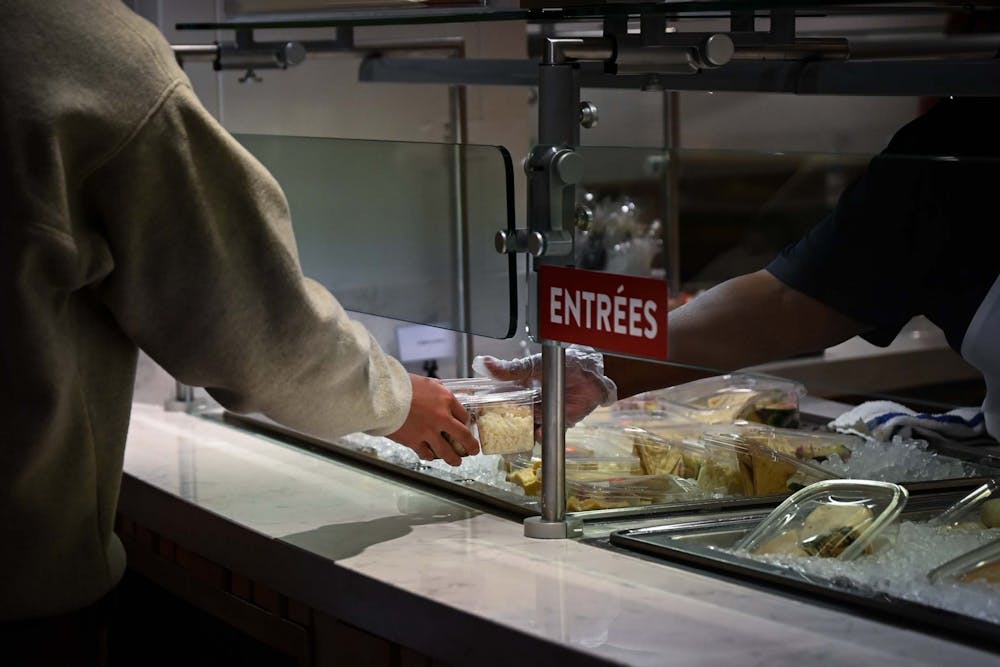
A student is handed a pre-packaged meal at Hill dining hall on Jan. 14.
Credit: Kylie CooperOne night, during my first year of college, as I was walking through the aisles of Wawa in the early hours of the morning on a quest to attain my beloved coffee, the dizziness of my eyelashes suddenly reconfigured into steady attentiveness. One printed message near the cashier caught my eye. It read: “You may not see it [because of the mask], but we are serving you with a smile.”
Anecdotal experience informs that it is not a rare occasion for Penn students to be left underwhelmed with their dining hall experiences. A substantial majority of Penn students are either unsatisfied with the current dining experience, believe that the experience provided is not congruent with the high price paid for a plan, or are in some form or the other agitated with the lack of flexibility that the dining plan provides. While this dynamic justifies, I believe, a demand for a better quality of food services on campus, are we entitled to demand better hospitality through expressions of kindness and friendliness from the dining staff? Can we ask for the smile behind the mask? I say we cannot.
We can demand professionalism but ought not to be the exploiters of emotional labor. I claim that while kindness is typically an expression of positive emotion, it can also be a medium through which we can conceal exploitation under the disguise of friendliness. What is the cruel side of kindness, then? The expression of power over the last 500 years (as philosopher Michael Foucault argues with his historical analysis of power as well) has changed drastically — it is no longer the case that a monarch rudely and viciously oppresses their peasants. Today, the expression of power is a lot more subtle. Kindness can very well be a medium of oppression. The classical Marxist example depicts the traditional exploited worker with their rude boss and compares it with the postmodern employer who is friendly and cheerful, asks you how your last night out was, but makes you work overtime and expropriates the profits of your surplus labor nonetheless.
Moreover, philosopher Slavoj Zizek provides another illustrative example of the concept. Imagine it’s Sunday afternoon and your old-fashioned, authoritarian father tells you (his young child), “You are going to visit your grandmother and you’re going to behave there properly.” The archetype of the tolerant, postmodern father, as he calls it, would say, in contrast, the following, “you know how much your grandmother loves you but nonetheless, you should only visit her if you really want to.” Zizek concludes, “every child who is not an idiot, and they are not idiots, knows that this apparent free choice contains an even stronger order, it’s not only ‘you have to visit grandmother’ but ‘you have to visit your grandmother and you have to like it.’”
The overwhelming majority of the dining staff at Penn are subcontracted, which means that the locus of responsibility for their treatment as workers is decentralized from merely Penn as a regulator. This apparent distance of accountability between Penn and some of its workers means that implicitly we, as students, share incremental parts of that responsibility. We ought to be more cognizant of the situation that these dining staff workers might find themselves in (the possibility of being overworked and underpaid). This dynamic makes the nature of any of our demands very delicate.
The fact that Penn is an elite institution may incline some to demand nothing short of customer service excellence on campus. While I think that is a sensible conclusion, I urge that we have to rethink what constitutes customer service excellence. While it may come to be a lot of things, I stress that kindness per se should not be included. We should be sufficed with professional service. I agree with the perspective that professionalism and kindness are not mutually exclusive per se, allowing for the possibility of both quality service and kindness. However, this should not incline us to equivocate kindness as a prerequisite or even a necessary condition of professional service. While the scenario in which both coincide is pleasant, it is not to be demanded. Demanding anything above that sensitive threshold (professionalism) is analogous to the previous message from the Zizekian kid: Not only should you work too much and be underpaid, but you should also like it.
Progressing toward a post-pandemic situation without masks, in a world where we have commodified smiles as an asset of customer service, they will continue to be masked by the market economy. In the absence of a genuine smile underneath all masks, be brave and give one yourself.
ARTUR VLLAHIU is a College sophomore studying philosophy from Kosovo. His email is arturvhh@sas.upenn.edu.
The Daily Pennsylvanian is an independent, student-run newspaper. Please consider making a donation to support the coverage that shapes the University. Your generosity ensures a future of strong journalism at Penn.
Donate






